The A-Z of the Russian Banya Posted by bota on Mar 15, 2021 in Culture, Russian life, Traditions, when in Russia
A trip to ру́сская ба́ня (Russian banya/ Russian sauna) is a healing cultural experience for your mind and body. Many Russians have a баня (banya) on their dachas and might be enjoying the “jumping in the snow after banya” in their backyards with the last of this winter’s snow.
Tips for Russian sauna:
- Avoid drinking alcohol. Despite the stereotypical associations of banya and drinking, this healthy spa-outing requires zero alcohol in-take.
- Avoid overeating or going on an empty stomach.
- Right before going inside the sauna, take a light shower but keep your hair dry. Also remember to wear a ба́нную ша́почку (banya hat) made of wool, cotton, or linen. The hat will keep your head from overheating and the rinsing off helps you open up to the heat.
- Note: These are my parents’ banya hats, and they say “В ба́не помы́лся — за́ново роди́лся!” and “Ба́ня парит – силу дарит”.
It’s best to па́риться захо́дами (to sauna in sessions) so that you slowly adjust your body to the warm heat. Пе́рвый захо́д (the first session) should be about 5-10 minutes and there is no need to climb on the top shelf. You also wouldn’t use ба́нный ве́ник (sauna whisk) at this point, but you should bring it inside the sauna to warm up and absorb some moisture.
Some people like to use essential oils (эфи́рные масла) in the sauna for health benefits and aromatherapy. The most popular choices are мя́та (mint), пи́хта (fir tree), эвкали́пт (eucalyptus). Dilute 7-8 drops of the oil in a bucket of warm water (could be the same one in which you are soaking the whisk) and splatter the water on the walls and ceiling inside the sauna.
Ба́нный ве́ник [banyy venik] is an essential part of the Russian sauna experience. Russians say:
Ба́ня без ве́ника – что самова́р без трубы. [A Russian banya without a whisk is akin to a samovar without a pipe]
В ба́не ве́ник – доро́же де́нег. [The whisk in banya is better than money]
It’s mostly referred to as a “whisk” in the US, though I have seen “bath/sauna broom” here and there. While the Russian “venik” is made from young tree twigs and can be translated as a household “broom” or “besom” that’s where the similarities end.
The tree twigs for the ‘whisk’ come from trees that have medicinal effects on the body. The most popular ones include:
birch – берёза
oak – дуб
linden – ли́па
alder – ольха́
eucalyptus – эвкали́птовое де́рево
The whisk is used to massage the body and Russians use different massage techniques and styles. As mentioned before, the venik has to be soaked in warm water so that the leaves soften up for the subsequent whisking sessions. Right before the massage, the soaked whisk is placed on the hot stones for a few seconds on each side. Depending on what you are comfortable with, you can customize the whisking techniques and their intensity. Likewise, you can be standing, sitting, or lying down on your stomach or back when receiving the whisking massage. Just make sure that the stroking and lashing movements are gentler on the breasts, stomach, and around the face.
Popular whisking movements:
*all gifs are by author
- Waving the whisk up and down in front of the person so that the hot air is enveloping them.
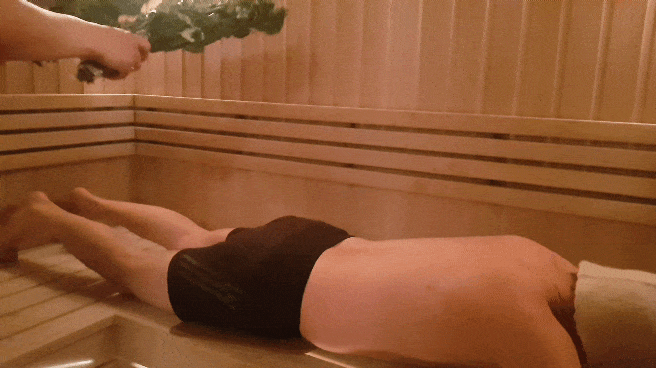
- Shaking the whisk over and along the receiver and pressing down to different parts of the body, especially the back and feet.
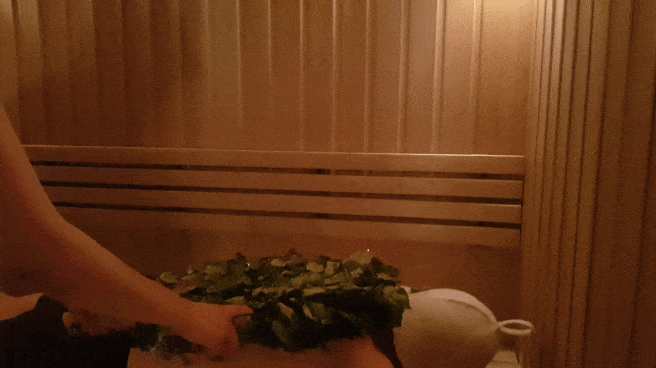
- Rhythmic lashing which can range from mild to strong beats.
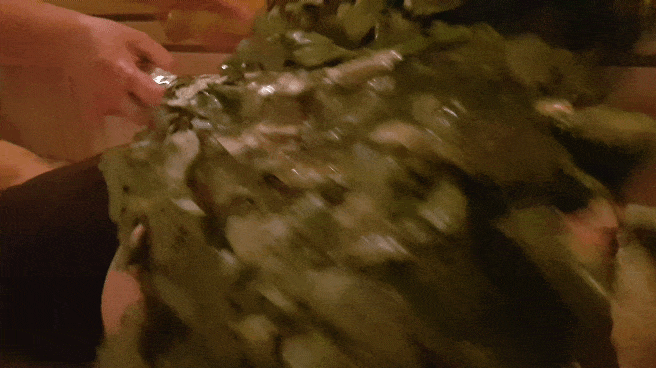
- Using gentle strokes to slowly slide the whisk along the body.
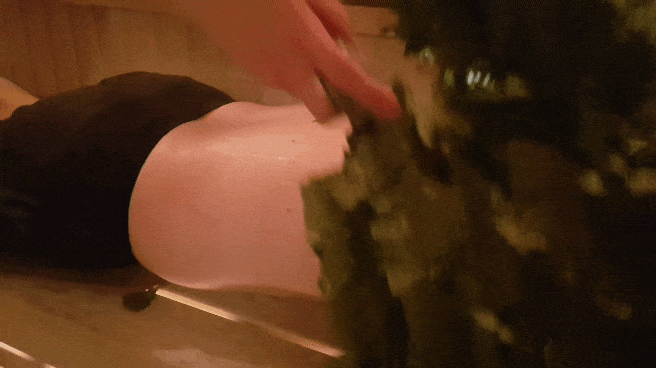
- Alternating between strokes and whipping.
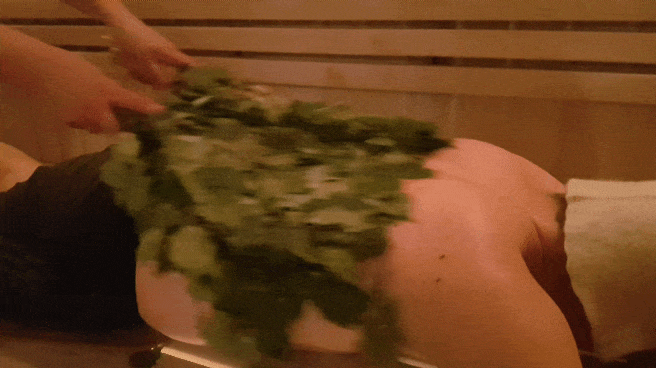
- Gentle compress, which means placing the hot whisk on the body (mostly back and feet) and firmly pressing on it for 5-6 seconds.
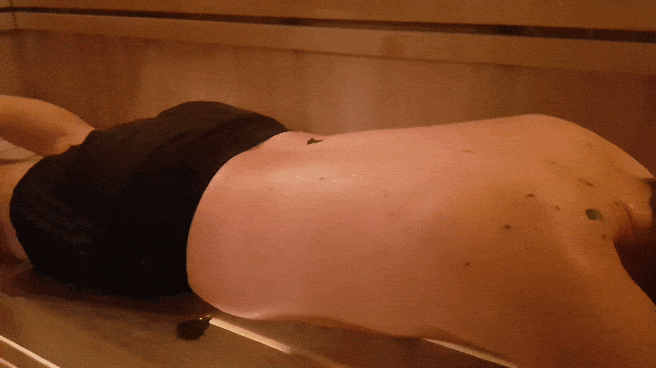
If you have a source of clean snow by the sauna – go ahead and jump in there right after the whisking session for the contract sensation. Otherwise, it’s great to rinse off with cold water. You can have a bucket ready to go, though most commercial saunas today will have a device like the one below ready to go:
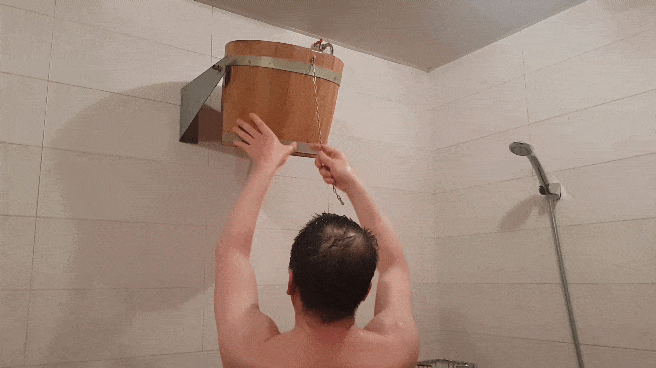
Remember, going to a Russian sauna is about massage, relaxation, and overall positive cultural experience for your body and mind – so don’t do anything you aren’t comfortable with. And if anyone starts pressuring you into having a really hard whisking session, just tell them: Ну, что ты прили́п ко мне, как ба́нный лист! [lit. Why are you stuck on me like a leaf from a sauna whisk?]

Build vocabulary, practice pronunciation, and more with Transparent Language Online. Available anytime, anywhere, on any device.



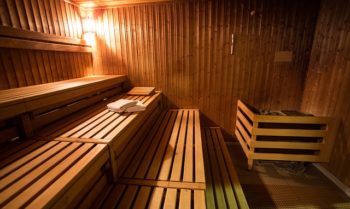
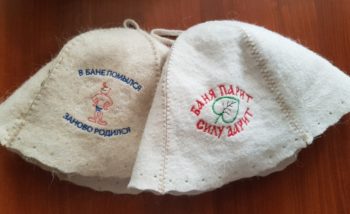
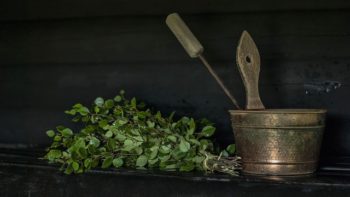

Comments:
LAKE:
A whisk is used for food preparation, it is not a good translation for Venik. English has a 2000 thousand year old tradition of adopting words from other languages for which the equivalent in English does not exist. e.g. Bungalow and pyjama are Indian words. Just like vodka and dacha, the words venik and banya should not be translated. As a native English speaker frequenting Russian speaking countries for over 20 years, they are some of the words that I never translate into English.
But thanks anyway for the article on Russian Banya culture.
bota:
@LAKE Hi and thank you for your comment! It was indeed a difficult decision to reference and use the word “whisk” for the Russian “venik” in this blog, though I did it with the best of intentions. You see, when I was looking at parallel and background texts for this post, almost all of the websites in English that talk about saunas in general (and Russian banyas specifically) referred to the “venik” as a “whisk”. As a native Russian speaker myself I was speechless too! But I chose to keep the word anyway, in case a non-Russian speaker or someone not as experienced with the Russian culture as you are wants to find out more on the topic or even look up a nearby Russian banya for a first-hand experience. But yes, you’re right, I’m all for English adopting the word ‘venik’)))
YMHEE:
@bota Yes, it’s true, a “whisk” is a kitchen utensil for mixing. Also, it is a small short broom, called a “whisk broom” or simply a “whisk”. So your use of “whisk” is perfectly correct in this context. And yes, it’s also true that English, and EVERY LANGUAGE, has a “tradition of adopting words from other languages”. For your continued edification, here’s just a few of the many words which the Russian language “adopted” from other languages: лагерь, тротуар, масштаб, абажур, Автострада, алкоголь.
Thank you for a very informative article!
Peace.
bota:
@YMHEE Thank you for such an insightful comment! A “whisk broom”! Now it makes a lot more sense.
p.s. Gotta love compound nouns)))
bota:
@YMHEE Also, do you think Icelandic would be an example of an exception to that rule?
Alan Sargeant:
Thank you for this article. I have enjoyed/appreciated the Banya for the past 15 years and I agree that there is no real translation for “венник”. It is a very social custom and there is a distinct culture around the Banya.
In my case it has always been birch leaves.
bota:
@Alan Sargeant Dear Alan, thank you for your comment))) And yes, birch leaves are my favorite too!